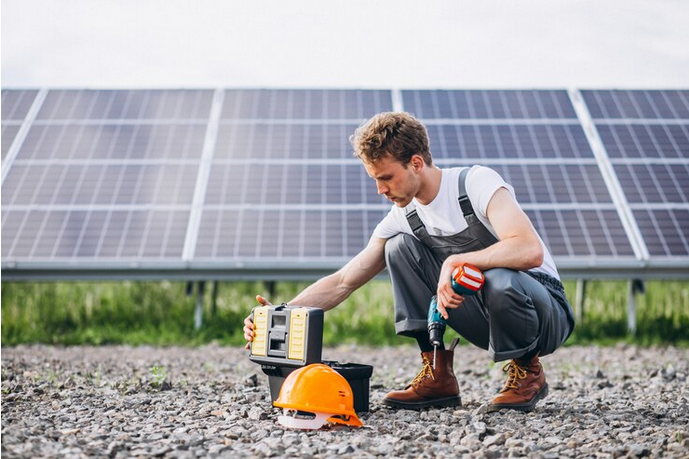Solar Energy Revolution: An Overview
The global shift towards renewable energy sources is one of the most critical responses to the growing environmental concerns facing our planet. Solar energy, in particular, has taken center stage as a clean and sustainable solution to our energy needs. Solar panels, the visible face of this transition, capture sunlight and convert it into electricity. But behind the scenes, solar inverters play a pivotal role in the efficient utilization of this clean energy. As we celebrate the progress of solar power generation, it's crucial to address the often-overlooked aspect of solar inverter disposal and the importance of embracing solar inverter recycling.
Understanding the Solar Inverter
Solar inverters are the unsung heroes of solar power systems. Their primary function is to convert the direct current (DC) electricity generated by solar panels into the alternating current (AC) electricity used in our homes and industries. In essence, solar inverters bridge the gap between the sun's energy and our electrical appliances. As a result, they enable solar power to be practical and useful.
The Need for Inverter Recycling
Solar inverters are essential components of solar energy systems, but they are not immortal. Just like any electronic device, they have a limited lifespan. Depending on the type and quality of the inverter, this lifespan can vary, but eventually, all inverters will reach the end of their operational lives. At this point, the question of disposal becomes crucial.
The Environmental Challenge
Inverter disposal presents environmental challenges that are often underestimated. Solar inverters, like most electronic devices, contain a range of materials, some of which can be harmful to the environment if not handled properly. These materials can include metals, plastics, and potentially toxic components like capacitors. The traditional approach of sending old inverters to landfills or incineration poses environmental risks. These risks are compounded by the fact that the number of solar inverters reaching the end of their operational life is increasing as the solar industry grows.
The Potential for Recycling
Recycling solar inverters provides an eco-minded solution to the environmental challenges associated with disposal. By recycling inverters, we can recover valuable materials, reduce waste, and minimize the impact on landfills and incinerators. This not only aligns with environmental sustainability goals but also offers economic benefits.
The Recycling Process
Solar inverter recycling involves several key steps:
- Collection and Transport: Collecting old or malfunctioning inverters from solar installations is the first crucial step. Efficient collection and transportation systems need to be in place to ensure that recyclable inverters do not end up in landfills.
- Disassembly: Once collected, inverters are disassembled to separate the different components. This step is critical for material recovery.
- Material Recovery: During disassembly, valuable materials like aluminum, copper, and electronic components can be recovered. These materials can be reused in the production of new inverters or other electronic devices.
- Safe Disposal: In the case of hazardous or toxic materials, safe disposal practices must be employed to prevent environmental contamination.
- Data Security: For commercial or industrial applications, data security is a significant concern when recycling inverters. It's essential to ensure that sensitive information is properly erased or destroyed during the recycling process.
Challenges in Solar Inverter Recycling
While the potential benefits of recycling solar inverters are clear, several challenges must be overcome to make it a widespread practice:
- Awareness and Education: Many solar system owners, installers, and technicians are not fully aware of the importance of inverter recycling. Raising awareness and educating stakeholders is crucial.
- Logistics and Collection: Developing efficient collection and transportation systems for old inverters can be challenging, especially in remote or rural areas.
- Regulations and Standards: The establishment of industry-wide regulations and standards for inverter recycling is necessary to ensure proper disposal practices and accountability.
- Data Security: Ensuring data security during recycling is a complex issue, particularly for commercial and industrial installations. This challenge needs careful consideration.
Towards a Sustainable Solar Ecosystem
Recycling solar inverters is not just about environmental responsibility; it's a pivotal step in establishing a truly sustainable solar energy ecosystem. Embracing inverter recycling can lead to several positive outcomes:
- Environmental Conservation: By recycling inverters, we can reduce the environmental impact of disposing of electronic waste, minimizing the release of harmful substances into the environment.
- Resource Efficiency: The recovery of valuable materials from old inverters promotes resource efficiency by reducing the need for virgin resources in new inverter production.
- Economic Opportunities: Recycling can create economic opportunities by generating revenue from the sale of recovered materials and reducing the overall cost of solar energy systems.
- Energy Savings: Recycling conserves energy by reducing the need for the production of new materials, contributing to the overall sustainability of the solar industry.
Conclusion: Closing the Loop on Solar Sustainability
As we celebrate the remarkable growth of solar power generation, it is essential to address the end-of-life phase of solar inverters. Responsible inverter disposal, especially through recycling, is a critical component of a sustainable solar energy ecosystem. It ensures that the environmental and resource benefits gained during the operational life of solar inverters are not offset by poor end-of-life management.
By embracing inverter recycling, we can minimize environmental impact, conserve resources, and promote economic opportunities. It's a collective responsibility, involving governments, organizations, solar system owners, and installers, to create awareness, establish efficient collection systems, and develop regulations and standards for inverter recycling. As the solar industry continues to evolve, inverter recycling is not just a choice; it's an ethical and ecological imperative that closes the loop on solar sustainability.
In summary, embracing eco-minded inverter disposal through recycling is a testament to the commitment to a cleaner, more sustainable future. As solar energy takes the lead in our transition to renewable sources, let's ensure that every part of the solar ecosystem contributes to our shared environmental goals. Solar invertors recycle is the missing link that completes the cycle of sustainability in solar energy, ensuring a brighter, greener future for generations to come.





Comments